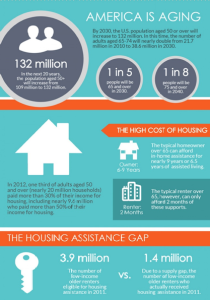Our lives are intertwined with the Internet of Things (IoT) – a world of digital…

The Trend of Seniors Living in Shared Homes Is Growing During COVID-19
While senior home-sharing is not a new idea, it has gained popularity among Americans during the current Coronavirus epidemic. The danger of COVID-19 infection in nursing homes and other long-term care living facilities, coupled with the isolation seniors have been facing, makes the idea of two, three, or more people 55 and older sharing a private living space an attractive proposition. Home-sharing can keep seniors safer while remaining independent, provide companionship, and help save money too.
Joint Center for Housing Studies of Harvard University
What Can Home-sharing Do for You?
Home-sharing provides more affordable living solutions to the increasing number of US seniors in the coming decades. Many of these seniors do and will rely heavily on their Social Security benefits to pay for housing and medical care. Still, the Social Security cost of living adjustment (COLA) remains tied to the Consumer Price Index for Urban Wage Earners and Clerical Workers (CPI-W). Using this CPI is disadvantageous to seniors because living adjustments do not represent the categories that are the biggest financial burden to senior life. The high cost of housing and healthcare, coupled with an inadequate COLA, causes older adults to cut back on necessities like medicine and food.
When a homeowner, who prefers companionship and does not mind a bit of additional income, meets another senior with a lower fixed income, both can benefit from one renting to the other within a private residence. According to Pew Research, 27 percent of adults 60 or older live alone in the US, and some of these individuals may be able to close the housing assistance gap through home-sharing. Independent living challenges are increasingly difficult, and a roommate option enables people to stay in their homes and find a potentially interesting companion. The social, psychological, financial, and health consequences of home-sharing are mutually beneficial.
Whether the homeowner or renter, there are money savings, and beyond companionship, there is an increase in safety and independence. Living together reduces the individual costs of rent or mortgage, utilities, groceries, transportation, and general living expenses. Health care and medical care costs also tend to lower when not residing in higher-priced adult living communities. A homeowner who is financially sound but perhaps burdened by too many household chores can charge a discounted rent in exchange for tasks or home maintenance.
How Do Seniors Benefit from Home-share?
Older Americans that home-share benefit significantly from the companionship a roommate can provide, especially because their social network is aging or they are coping with the loss of a spouse creating significant isolation. According to Sunshine Home Share, a recent government report notes that having a social network provides a “strong protective effect on seniors’ health.” It turns out your senior roommate is likely to keep you healthier and may even offer an enduring new friendship.
A roommate’s presence can also provide safety and protection if you fall or need someone to call for urgent medical care. If a roommate has difficulty bathing, dressing, or other personal care activities, the presence of another in-home offers some security in the event of an incident. Some roommates may still be driving and have a car, which can facilitate erranding and entertainment outside the home. Eventually, most seniors will end up in some type of assisted living, but until that life transition, having a roommate promotes better health and money savings while living independently.
Home-sharing is an alternative and affordable senior housing arrangement that has produced many online non-profit and for-profit groups. Approach finding potential housemates and compatible senior roommates with caution, particularly when sharing personal information. Many of these sites provide profiles of potential roommates that can help narrow a search to find a good fit, but they often look better online than they are in real life. The truth is that not all roommates will be good ones, and every contractual roommate arrangement you enter should have an escape clause in the event things do not work out.
Any potential roommate needs evaluation that includes background checks, particularly if the goal is a long-term living situation. If you are a homeowner seeking a senior roommate living arrangement to lessen your financial burden, and provide more safety and companionship, speak with an elder law attorney before entering a legal agreement. If you reach out to us, we can help ensure that your assets and estate plan are protected as you enter into a home-sharing arrangement. We would love to help – contact our offices in Midway, Erie, and Franklin PA.




